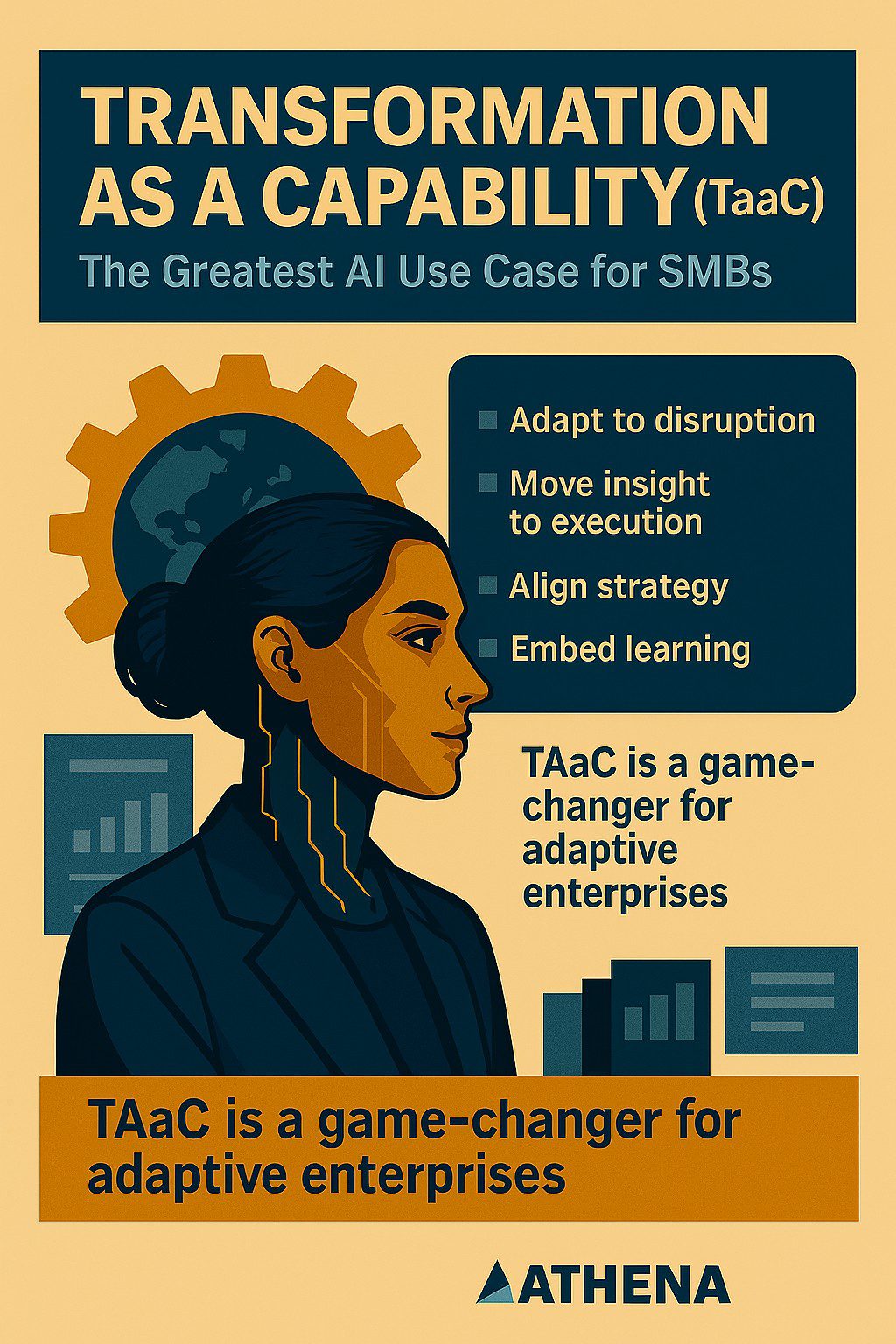
Transformation as a Capability (TaaC)

The Greatest AI Use Case for SMBs
Why the Future Belongs to Adaptive Enterprises
In the fast-moving world of artificial intelligence, it’s easy to get distracted by shiny, narrowly focused innovations. AI chatbots answering customer questions, predictive maintenance avoiding machinery downtime, or fraud detection algorithms spotting anomalies in banking—these are all powerful examples. But they share one critical flaw: they solve one problem at a time.
It’s time to raise the bar.
The real promise of AI isn’t about better service tickets or fewer repairs. It’s about fundamentally changing how a business responds to change. Enter the most powerful and transformative AI use case yet:
Transformation as a Capability (TaaC)
TaaC doesn’t just plug AI into an existing workflow—it embeds AI into the core operating model of the business. It turns transformation from a one-off project into a permanent muscle. It lets small and mid-sized businesses (SMBs) do what only large corporations used to manage: adapt continuously, quickly, and confidently.
Let’s explore why this matters.
Why TaaC is a Game-Changer
Most AI applications today are isolated:
- Predictive maintenance reduces downtime on machines.
- Fraud detection flags suspicious transactions.
- AI chatbots improve customer service.
- Robotic process automation (RPA) reduces repetitive back-office work.
These are important—but tactical. They don’t help a business evolve. That’s where TaaC shines.
TaaC equips businesses with the ability to:
- Adapt to disruption without fear.
- Move from insight to execution 3x faster.
- Align teams and strategy continuously.
- Embed learning and change across all levels.
In short, it institutionalizes resilience, speed, and intelligence.
The Engine Behind TaaC: AI-Driven Transformation Frameworks
Transformation as a Capability doesn’t happen by accident. It requires structure. One such structure is the Opportunity-to-Operations (O2O) framework, built by BusinessGPS.ai.
The O2O model maps every business change—opportunity, threat, regulation, or disruption—into a clear execution path. It dynamically identifies where your strategy is misaligned, where your capabilities are weak, and where transformation efforts will get stuck. It’s not a plan—it’s a living system.
And it’s powered by embedded AI agents. These are not just dashboards. They are real-time, role-aware digital coaches that:
- Offer just-in-time learning for teams.
- Flag risks before they become bottlenecks.
- Nudge users through critical steps in a transformation journey.
Imagine every team member having an AI guide that knows what they’re doing, where they’re stuck, and how to help them move forward. That’s the magic of TaaC.
How TaaC Compares to Other AI Use Cases
| AI Use Case | Scope | Adaptability | Strategic Value |
| TaaC | Enterprise-wide | High | Enables all others |
| Predictive Maintenance | Equipment ops | Medium | Tactical cost saving |
| Fraud Detection | Financial transactions | Low | Risk reduction |
| Precision Medicine | Healthcare only | Medium | Niche life-saving value |
| AI Chatbots | Customer support | Low | Improves service quality |
| RPA | Back-office automation | Low | Efficiency only |
TaaC isn’t just a “use case.” It’s the capability that makes every other use case better. While the others optimize a department or function, TaaC changes the entire business operating model.
SAP and the TaaC Movement
SAP recently declared a strategic pivot: digital transformation must be seen not as a destination, but a continuous capability. Through acquisitions like Signavio (process intelligence), LeanIX (enterprise architecture), and WalkMe (digital adoption), SAP is building the very stack required to support TaaC.
They’re creating systems that:
- Make change discoverable.
- Guide users through transformation.
- Keep people, process, and technology aligned.
SAP’s vision is clear: make Transformation a Service. They’re enabling even SMBs to continuously improve without massive consulting budgets. That’s TaaC in action.

Why SMBs Should Care
For too long, SMBs were locked out of serious transformation. Not anymore.
TaaC levels the playing field:
- AI coaches give SMBs the intelligence once reserved for enterprises.
- Frameworks like O2O remove the chaos from change.
- Embedded insights ensure that action is always connected to strategy.
The result? SMBs gain agility at scale. They can pivot, grow, or restructure faster than their size would suggest. They don’t fear disruption—they leverage it.
Final Thought: TaaC Is the Master Use Case
If you believe AI is truly transformative, then stop thinking tactically. Stop looking for isolated wins. Instead, embed the capability to transform into your business.
TaaC is not about doing more with less. It’s about becoming more—more agile, more adaptive, more aligned.
And in today’s fast-changing world, that might just be the greatest AI use case of all.





